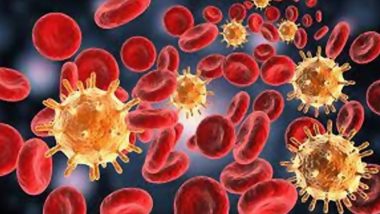Washington, February 4: Candida auris is a dangerous fungal illness rapidly spreading throughout the United States. Last month, four persons in the state of Washington tested positive for it. According to an NBC report, experts warn that even while infections are uncommon, they can still pose a risk because of their high death rate, medicine resistance, and ease of transfer inside medical institutions. The public health office for Seattle and King County announced that it had discovered three more cases of Candida auris infection last week after the confirmation of the first case on January 10.
The infection usually affects people with compromised immune systems and is resistant to a number of widely used antifungal medications. It is often discovered in hospital patients who have breathing tubes, feeding tubes, or catheters. Mucormycosis, Fungal Infection Trigerred by COVID-19, Can Turn Dangerous if Left Untreated.
The Centres for Disease Control (CDC) states that it can result in infections in the bloodstream, open wounds, and ears, among other areas of the body. The symptoms depend on the location and severity of the illness. The symptoms of a bacterial infection might resemble those of Candida auris. Nevertheless, infections may not always present with the same set of symptoms. Even in healthy individuals, it can infect the skin and other parts of the body. This is also referred to as "colonisation," in which a person may spread it to others without necessarily getting sick.
"Someone who is colonized can still transmit C. auris onto surfaces or objects that they contact, which can then spread it to other patients," the CDC wrote on its website. A patient should be kept apart from others who are at danger if they are colonised or sick. Gloves and gowns should be worn by the carer, and disinfection products should be used to clean the room. Deadly COVID-19 May Have Originated in Raccoon Dogs in Wuhan; New Study Hints at Animal Spillover.
To stop the spread of Candida auris, people should wash their hands or use alcohol-based hand sanitiser before and after visiting a patient's room, as well as before and after coming into touch with the patient's medical equipment. Since the disease's discovery in Japan fifteen years ago, the number of cases has increased dramatically. According to the outlet, the number of cases increased from 53 in 2016 to 2,377 in 2022. The CDC and World Health Organisation have classified the fungus as a developing danger due to its rapid expansion over 40 countries and most US states. CDC statistics from 2021 show that 1,471 persons were affected by the pathogen.
(The above story first appeared on LatestLY on Feb 04, 2024 04:42 PM IST. For more news and updates on politics, world, sports, entertainment and lifestyle, log on to our website latestly.com).













 Quickly
Quickly




















